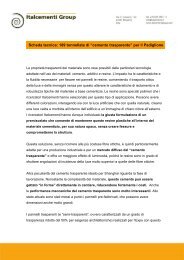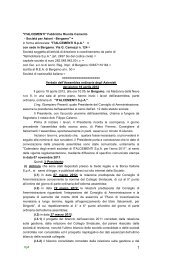2011 Annual Report - Italcementi Group
2011 Annual Report - Italcementi Group
2011 Annual Report - Italcementi Group
You also want an ePaper? Increase the reach of your titles
YUMPU automatically turns print PDFs into web optimized ePapers that Google loves.
No limits to re-eligibility of directors are envisaged, although directors holding the same position for more than<br />
nine years in the last twelve years could be considered - on voluntary basis - no longer to meet the<br />
independence qualification pursuant to the Code of Conduct.<br />
Pursuant to the current regulations, at least one of the members of the Board of Directors, or two if the Board<br />
of Directors consists of more than seven members, must be vested with the independence qualification<br />
established by the law for the members of the Board of Statutory Auditors, while the law requires all directors<br />
to meet the good reputation requirements established by the Minister of Justice for statutory auditors’<br />
regulation.<br />
The Code, as stated by the Corporate Governance Committee, requires an adequate number of non-executive<br />
directors to be independent in the sense that they do not have, nor have recently had, directly or indirectly,<br />
relationships with the company or with parties linked to it, such as to influence their independence of judgment.<br />
Should an elected director during their term of office no longer satisfy the good reputation requirements<br />
established by the law or the by-laws, their office shall terminate.<br />
Should the independence criteria prescribed by the law no longer be met, the director concerned must<br />
immediately inform the Board of Directors. In the event, the office of the director shall terminate, except in<br />
cases where such criteria are still held by at least the minimum number of directors envisaged by the current<br />
regulation.<br />
No exception to the ban on competition envisaged by art. 2390 of the Italian Civil Code has been authorized by<br />
the shareholders’ meeting or is envisaged by the Company by-laws. Moreover, no director is a shareholder<br />
with unlimited responsibility in competitors or runs a competing business on their own or on behalf of third<br />
parties, or is a director or chief operating officer in competitors.<br />
Pursuant to the Company by-laws, the Board of Directors is vested with full powers of ordinary and<br />
extraordinary company management. It may, therefore, perform all acts which it deems necessary to achieve<br />
the business purpose with the sole exclusion of those expressly reserved by law to the shareholders’ meeting.<br />
Besides the powers vested with the Board of Directors by law and by the Company by-laws regarding the issue<br />
of shares and bonds, in compliance with art. 2436 of the Italian Civil Code, resolutions on the matters listed<br />
below are assigned not only to the extraordinary shareholders’ meeting, but also to the Board of Directors:<br />
- incorporation of wholly owned or at least ninety percent owned companies;<br />
- transfer of the registered office, provided that it remains within Italy;<br />
- establishment or removal of secondary offices, in Italy and abroad;<br />
- reduction of the share capital in the case of withdrawal by a shareholder;<br />
- amendment of the company by-laws to comply with legal requirements.<br />
The Board of Directors, in compliance with the by-laws, meets at least once every quarter. At these meetings,<br />
the executive directors report to the Board and Board of Statutory Auditors on significant transactions<br />
undertaken in execution of the powers granted to them.<br />
The Code underlines the key role played by the Board of Directors and sets out and supplements its specific<br />
duties which include, among other things: the assignment and termination of delegated powers to senior<br />
officers; the evaluation and approval of strategic, business and financial plans as well as the assessment of<br />
business forecasts and the adequacy of the organizational, administrative and general accounting<br />
arrangements of the company and subsidiaries; the examination and approval of the accounting entries for the<br />
period; the prior evaluation and approval of strategic transactions; the assessment of the company operational<br />
structure; the determination of the remuneration of directors vested with special powers and the manager in<br />
176

















